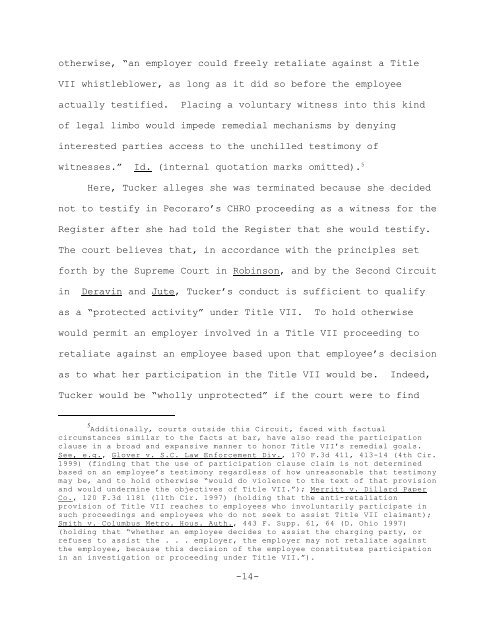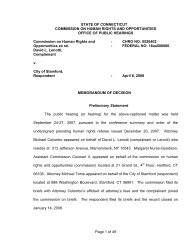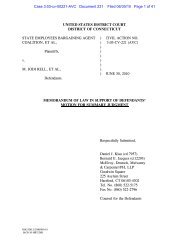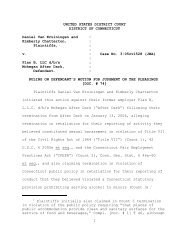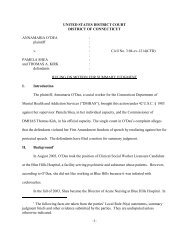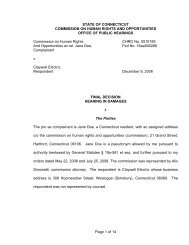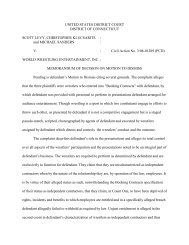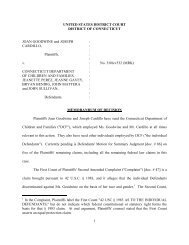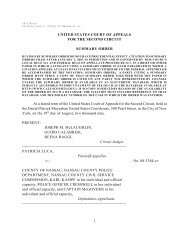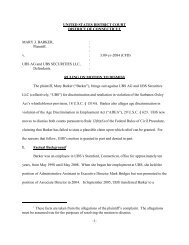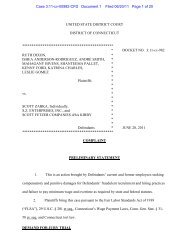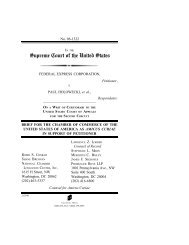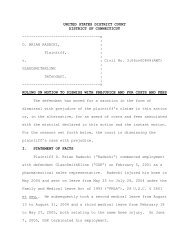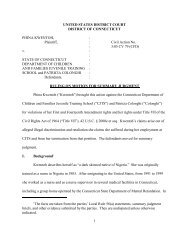Tucker v. Journal Register East - Connecticut Employment Law Blog
Tucker v. Journal Register East - Connecticut Employment Law Blog
Tucker v. Journal Register East - Connecticut Employment Law Blog
You also want an ePaper? Increase the reach of your titles
YUMPU automatically turns print PDFs into web optimized ePapers that Google loves.
otherwise, “an employer could freely retaliate against a TitleVII whistleblower, as long as it did so before the employeeactually testified. Placing a voluntary witness into this kindof legal limbo would impede remedial mechanisms by denyinginterested parties access to the unchilled testimony ofwitnesses.” Id. (internal quotation marks omitted).5Here, <strong>Tucker</strong> alleges she was terminated because she decidednot to testify in Pecoraro’s CHRO proceeding as a witness for the<strong>Register</strong> after she had told the <strong>Register</strong> that she would testify.The court believes that, in accordance with the principles setforth by the Supreme Court in Robinson, and by the Second Circuitin Deravin and Jute, <strong>Tucker</strong>’s conduct is sufficient to qualifyas a “protected activity” under Title VII. To hold otherwisewould permit an employer involved in a Title VII proceeding toretaliate against an employee based upon that employee’s decisionas to what her participation in the Title VII would be. Indeed,<strong>Tucker</strong> would be “wholly unprotected” if the court were to find5Additionally, courts outside this Circuit, faced with factualcircumstances similar to the facts at bar, have also read the participationclause in a broad and expansive manner to honor Title VII’s remedial goals.See, e.g., Glover v. S.C. <strong>Law</strong> Enforcement Div., 170 F.3d 411, 413-14 (4th Cir.1999) (finding that the use of participation clause claim is not determinedbased on an employee’s testimony regardless of how unreasonable that testimonymay be, and to hold otherwise “would do violence to the text of that provisionand would undermine the objectives of Title VII.”); Merritt v. Dillard PaperCo., 120 F.3d 1181 (11th Cir. 1997) (holding that the anti-retaliationprovision of Title VII reaches to employees who involuntarily participate insuch proceedings and employees who do not seek to assist Title VII claimant);Smith v. Columbus Metro. Hous. Auth., 443 F. Supp. 61, 64 (D. Ohio 1997)(holding that “whether an employee decides to assist the charging party, orrefuses to assist the . . . employer, the employer may not retaliate againstthe employee, because this decision of the employee constitutes participationin an investigation or proceeding under Title VII.”).-14-


